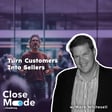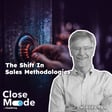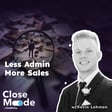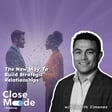Introduction to Guests and Signified
00:00:03
Speaker
Hello, and welcome to another edition of Close Mode, the enterprise sales show. I'm Brian Deere, our CEO of Close Strong. And today I'm really lucky to be with Dan Zhao, who is, Dan is the VP of RevOps at Signified. And if you're not familiar with them, Signified is pretty cool. They leverage big data, machine learning, and manual review to provide a financial guarantee against fraud for e-commerce companies. So Dan, welcome to the show. Yeah, thanks for having me, Brian.
What is RevOps and Why is it Important?
00:00:30
Speaker
So week or so ago, we're chatting generally about RevOps and how it's ah relatively sort of new in early stages of its life cycle. um And I agreed with you on that and thought, hey, we we should probably have a RevOps channel on on the podcast for sure.
00:00:48
Speaker
But that being said, um I have some questions for you, for for those who are maybe even maybe early in their RevOps career ah to kind of chat a little bit about that. So what do you think? What are the business drivers that that did drive the need for this function? How did it evolve? How did it come about? Yeah, I know for sure. Well, first of all, thanks for having me on the podcast. I know this the topics typically span like enterprise sales and go to market motions, which and my I myself actually came from an enterprise sales background prior to moving into revenue operations, so ah definitely close to my heart there. But I like the question about like you know what drives RevOps, what are the some of the business drivers that have really caused a lot of organizations to adopt this as a key function and how they sell their products, retain their customers, and renew them.
00:01:35
Speaker
Well, what I typically have seen is that the most common business driver for organizations to have revenue operations as a function built out is the natural silos that almost every business experiences across its people, processes, data, and tools. And these silos typically cause what I would call a disjointed customer journey and experience, which ultimately hurts revenue and profits and all the other key business metrics that you might look at.
Understanding RevOps vs. Sales Operations
00:02:03
Speaker
And if you take a step back for defining what revenue operations or RevOps or short really is, it's not always really clear, right? I think a lot of people have mistaken it as like sales operations or sales ops rebranded, but it's far from that. It's very much looking at the whole customer journey.
00:02:20
Speaker
um and ah focus on RevOps, its mission, its purpose is really on being able to unify all the primary go-to-market functions, sales, marketing, customer success, to essentially row in the same direction, right? Be unified to have better streamlined processes, handoff points between, let's say, marketing and sales, sales and CS, to all function in that direction of moving the needle on the revenue that are the revenue metrics that really matter. So I see RevOps really then kind of, you know, coming about from this key business driver of silos and, you know, disjointed customer experience to help in a few practical ways across removing those silos that I mentioned with people, data processes and
Real-World Applications of RevOps
00:03:00
Speaker
tools. Yeah. And I'll give some examples because I i think people ask the question of like, you know, okay, cool. We have these silos. We have some revenue problems and leakage. What does RevOps really do to help fix that? Right? Yeah.
00:03:14
Speaker
And I think there's been a few ways that I've seen this, you know both when I was a sales leader working with RevOps people to somebody who has evolved his career, pivoted to moving to the RevOps leadership position that I'm in today at Signified. um you know One example is if you have a demand generation problem, which I think a lot of people typically do in B2B technology. um RevOps's job is really to be the architect to help the marketing and partnerships and business development teams with architecting how that demand generation engine might need to evolve with lead scoring, lead routing, and the follow-up processes.
00:03:48
Speaker
and then ensure that that engine has a feedback loop between the marketing and sales teams. So you might need to establish a new lead scoring model to look at high-intense signals and high-fit leads that only those route to the sales team, and vice versa. You you have to ensure the sales team has a feedback loop to be able to tell the marketers, ah hey, this was a really good lead from this source, and here's why. And here was a lead that didn't convert and why we disqualified it. And that's, you know, important to be able to refine the campaign engine, right? Like what campaigns worked and didn't. Another really good example I'd say now is Bob's really leads the way on carving out and defining the ideal customer profile or ICP accounts.
00:04:31
Speaker
based on what your best customers look like. So this is kind of bridging the gap between, you know, the post sales customer success world and pre sales, like marketing and sales, by looking at, hey, what are the attributes of our best customers that we onboard that have higher net retention and renewal rates with us that find the value of our product and become our future advocates, essentially, the people who speak with us at events, they become our references for customers and also like refer business to us. Once you're able to define those attributes, you can essentially carve out your ICP accounts and then build one-to-one and one-to-few ABM plays for the marketing team, as well as ensure that the right counts are staffed with the right salespeople like PDRs and AEs.
00:05:13
Speaker
So you're putting the right people in front of the right accounts. And ultimately, that allows you to continue this flywheel of ensuring, hey, you've got the right customer accounts um that we know are good. And those are the right prospects we go after. And you continue to fill the funnel and onboard only good customers, right? And that solves the net retention problem that increases the customer experience and improves that journey overall. So those are just a couple examples of where our robots comes in to remove those silos.
RevOps as Revenue Chain Management
00:05:39
Speaker
Um, I have kind of, that's fascinating to me and I have a couple sort of pop up questions for you. You know, it's funny, years years ago, uh, a teammate of mine and I wrote, uh, an article about what we called, uh, revenue chain management. And, and what we're, Dan, what we're doing is, is looking at supply chain management came about, uh, by booze, Allen in the eighties. And they said what they were doing is there's always these disparate parts of an organization that we're buying stuff.
00:06:07
Speaker
and And it was impacting customer value at some place. And it's interesting because we we started thinking about, well, that's kind of similar and on the sales side, which is why, you know, we did, we sort of tongue in cheek, but really did mean it, the need for revenue chain management function, all the disparate pieces that were impacting the revenue chain. And yeah, it's interesting because it kind of sounds like RevOps is that revenue chain management. Do you think that's a fair metaphor? Yeah, I love that metaphor. I like thinking about the revenue operations team as being like the conductor of the orchestra, the revenue orchestra in a lot of ways. But I like what you're saying too, the revenue chain management piece. I actually recently read the book, The Goal by L.E. Goldratt. And that was all about essentially how it's about a manufacturing plant. But it honestly translates so well to like the B2B technology space as well with
00:06:58
Speaker
how you need to focus on like driving all the components of a plant or you know an organization towards the same goal of driving revenue, driving profit, yeah and ensuring that you don't you know get too into the minutia of local optimization. So like you don't want to just optimize the sales team to keep booking deals if all those deals end up never going live, or they always end up being churns, or yeah essentially just a bad situation overall for the business and a bad buyer experience too. so Totally you should be looking at those silos or those process gaps and you know fixing that for the whole system I was giving a talk a couple of weeks ago and
00:07:35
Speaker
This is from a lot of interviews on the show. A lot of sales leaders, revenue leaders have said to me, you know, we used to enjoy five to five to six acts of pipe, right, to go. And they're saying in 23, 24, we're looking at sort of 2X. And then ah Jim Dickey, who I often quote, um is is an advisor to us and an industry analyst. Jim said, look, in 2024, It's gonna be less about top of the funnel and more about closing what's in your funnel, especially if you only have two acts. I'm wondering, one, how you feel about that in general, and two, I'm really curious about what's the RevOps role. if If that is, in addition to still continuing to fill it, we've we've got to get a higher percentage of what's in there. So do you believe, what do you agree with that notion of where we're at and and pipe and and what is the role of RevOps in converting more in 2024?
00:08:24
Speaker
Yeah, absolutely agree with that. I think more and more now, there's a lot more consolidation happening across the industry for especially technology solutions, right? There's increased scrutiny on everyone's financials because there's been market trends on um you know, increased interest rates to combat
Economic Pressures on RevOps
00:08:43
Speaker
inflation. That means that investors have had other places they can park their money. They're not parking it maybe in certain risky bets. And then the companies in their portfolio have had to essentially be, you know, increase their cash flows and ah become more profitable, right? its Less a little bit about that 30% year over year growth. I think a lot of board of the directors would be willing to trade 30% year over year top line revenue growth for 10 to 20%.
00:09:08
Speaker
while maintaining a path towards profitability. Yeah. And I think that's why you're seeing a lot of, especially in tech, yeah a lot of tech companies sell to other tech companies. ah That's why you're seeing a lot less companies that are qualified pipeline, right? That's why instead of five to six X pipe pipeline coverage to target, it's probably only two X. Yeah. Um, so I'm not surprised by that. And you kind of see that too, uh, with revenue operations seems that by different revenue execution solutions or platforms that there's more scrutiny there. So I'm sure, uh, that's the case. I love your question about, Hey, you know, how does rev ops help not just with top of funnel? And but I think I gave two examples there originally about the account identification and demand generation engines around lead models. Yes. But.
00:09:51
Speaker
The key part for RevOps too is helping with ah converting opportunities as well, right? So recently here at Signified, we helped in a couple ways, right? There is one was being able to define our sales process very clearly on like, what is the stage definition, ah partnering with the sales leadership team on identifying what clear exit criteria would be.
Enhancing Sales Conversion with RevOps
00:10:11
Speaker
So before you can go to stage zero to stage one, like what are some of the things you need to do, right? yeah But then being able to also essentially evaluate that process and see how it's going is also a critical part of how RevOps helps with that conversion ah piece, right? We have a lot of data in our ecosystem today to be able to inform us on what deals are likely to convert
00:10:32
Speaker
and which deals are unlikely to convert. So there's some risk signals that RevOps can surface and insights to help the sales leadership team prioritize which deals might not be multi-threaded enough or which deals need to have better access to power. right like And then if we're engaging the right buyer personas, we have all this data to tell us like which buyer personas and job levels of our opportunity contacts that the buying committees we've engaged are actually likely to help us convert. So there's a lot of that kind of ah insights that help with that convergent piece, right? Because converting is harder than ever, right? We've seen data that like you have a way a higher chance, I think almost like double the chance of winning a deal if you go from single-threaded, maybe one or two folks that you're talking to, to four to five people in the buying committee. yes So I think that's just one of the ways that RevOps helps with converting.
00:11:22
Speaker
Cool. Um, yeah you know, you made a point, uh, a couple of minutes ago about the idea of customer profile and it, and it's interesting cause I was mentioning this strategic account management association. I was speaking at the conference. and A gentleman come up to me after and we were chatting and and he made to me, like we all know that, we all know ICP is important, but he tied it to renewal, which which immediately made sense. he He talked about an opportunity. He was with a relatively small tech company and he said, the moment we signed these guys, they weren't buying from us in the right way that we could drive the greatest amount of value. Like we weren't engaged with them at maybe multi-threaded, as you said, and he said,
00:11:57
Speaker
Lo and behold, here we are at renewal and they're not going to renew. And he said, I could have told you that. and And it was interesting to me. It's the first time someone actually made that connection from one end all the way to the other end to renewal. And it just sort of exploded in my brain to go, wow, it's like, I always think of about ICP as conversion. what What's going to convert at a higher rate than somebody else. But you you made me think of that when you brought it up earlier that it's, it it is tied to renewal and a real leading indicator of renewal. Yeah. I like to tie to like net retention too. Like, uh, if you're a growth company, it's not just who's going to renew with you, but which customer you're going to sign, who's going to grow with you. Yeah. Yep.
RevOps in the Post-Pandemic Era
00:12:34
Speaker
Yeah. Um, so what do you think if if we kind of jump up to, to a macro level, did the, the, the function of rev ops, was it driven by kind of macro shifts in, in the market? Uh, what, you know, what changed where the old, the whole model was no longer working in your opinion.
00:12:53
Speaker
Yeah, I mean, I think revenue operations has been around for a while, it's definitely become more popularized. Yeah. um Because there's more more pressure on organizations that grow ah profitably and efficiently, right? I've seen some articles about this term like profitable, efficient growth. Um, that's been a very hot buzzword and kind of the go-to-market community. And even though Revoff's is around for even since the early 2000s, I think it picked up steam a lot in the last 10 years and especially the last few years from post pandemic, right? Where yeah money wasn't as free and people had to think very thoughtfully about how they were going to scale their organization from maybe a 20 to $50 million dollars venture to the a hundred million plus or even 500 million plus journey. So I think that macro, um,
00:13:40
Speaker
trend of profitable, efficient growth has led to RevOps becoming more well adopted. And also just naturally, you're seeing like people wanting to cost consolidate. And one of the initial benefits of RevOps is, hey, have you got a siloed marketing ops, sales ops, and CS ops team, and maybe a Salesforce or tools team? It always makes sense to bring them under one umbrella because you do get some natural cost savings, you reduce a lot of the kind of duplicitous tools and processes and data bloat that was happening between those teams, and you get some immediate benefits there.
Data Challenges in RevOps
00:14:14
Speaker
So I think a lot of C-level and executive teams have realized that this is a really powerful function, especially for your revenue engine or your go-to-market teams.
00:14:23
Speaker
you know ah you You mentioned to me and in an earlier conversation that DevOps has to solve the data problem. um and and And it's interesting because after you said that Dan, I was thinking like, We're swimming in data, so is the data problem, there's there's too much or there's not enough or not the right, right? There's so many ways to define the data problem. So I'm really curious from from your role, what is the data problem? Yeah, yeah, I mean, I definitely think there's too much data, but too much data can also be made a strategic advantage for your organization, right? um I had a previous CEO of mine say that you have to find the signal and cut through the noise, right? Signal to noise ratio, in this case is what he's referring to.
00:15:05
Speaker
And a lot of the data we have is noise. And I think it's RevOps job to be able to cut through that noise and figure out the data that really matters to provide insights to help us like operate more effectively. right like A lot of that data is really critical for things like I've already mentioned, like ICP definition. But it can also be useful for identifying risky deals. Another example I gave about like how RevOps can help prioritize and identify those deals that might need more cross-functional resourcing in order to win. And then the other things I think about with data and being able to solve that problem is it's almost critical to any process kickoff or any like automation that the business needs to run smoothly. And I think about automation as something that helps the go-to-market teams, whether it's a marketer trying to run a campaign or a sales rep trying to do outbound prospecting or selling.
00:15:54
Speaker
or or the CSM who was just trying to manage their daily book of business for renewals and mitigate churns and do upsells. Foundation to kick that off is all relying on data. So I give you an example of why that matters. Let's just say that you need really good renewals data to be able to trigger like a opportunity of Salesforce being open to um track an upcoming renewal, right? Especially for, um, more mid-market or SMB CSMs, they might have a book of business that is 20 plus accounts. Maybe some of them are managing hundreds of accounts that they have to just react to and figure out how to prioritize their time on who do I have to spend time with to renew yeah or essentially resolve and mitigate from churn.
00:16:39
Speaker
So if you have really good data on usage, on the customer, you know exactly what contract details we have in terms of like when they need to renew, you can build automation to trigger the Salesforce opportunity for renewal. You can put those in front of the but CSM in this case, it prioritizeed and then that helps with the problem of like, net retention, renewals, ah current customer revenue. And I think a lot of people have focused a lot of their time, especially in RevOps, because you know, as a revenue engine, like orchestra, dr like a conductor, yeah, you're thinking about like, what's really mattering in the business right now. And a lot of the times, it's more expensive to acquire a new logo customer, then just take your current customers and kind of defend your turf and grow your turf, right?
00:17:18
Speaker
yeah So I think that has been really critical and you have to get the data right. So a lot of work on my team, for example, is focused on how do we instrument the data to make sure it's available? And how do we ensure there's processes in place and controls to ensure that data stays clean? Because if we don't have clean renewal ah date data, then that whole process I just described to you yeah breaks down completely. Yeah.
The Role of Coaching in Improving Conversion Rates
00:17:40
Speaker
So it's it's funny, I mentioned to you as we were getting ready for today's show that I was i've really looking forward to talking to you because personally I have so many questions that I'm really interested in your answer. And one is, you know, in in my past business, ah we did a lot of human deal coaching um and then.
00:17:57
Speaker
in my new business, you know, we, we do, uh, AI enabled coaching, but my, and my my question, and I want your honest answer, like, where do we see some data that suggests that, that really high level human deal coaching makes an impact on win rate. And I'm just wondering with all the data and the analytics and tools, like how it lands in your RevOps mind about the role, uh, a really good frontline sales manager coach plays in conversion. Oh, it's it's absolutely critical, right? I think um you mentioned the problem of not having enough pipe, like only 2x coverage. And I think that really puts a spotlight on what you have. And it's really hard nowadays to get that first initial discovery call. yeah Something we've been working on signified is figuring out like, how do we operationalize and enable our frontline managers
00:18:48
Speaker
to be effective and consistent with coaching ah new sales reps as well as the tenured veterans that we have on the team as well to be effective in that first call because oftentimes it's not very as hard to like convert that inbound who knows they have the pain, they're educated, they might know what your solution already does. It's actually a lot harder to have that outbound meeting because usually that person is not expecting to buy your company's products or services and then help be a thought leader to them and I think a lot of that comes with the frontline manager being able to give high-level coaching on how they can make the sales conversation a conversation on industry trends, pain points, and make it very educational and informative, rather than a hard pitch of like, hey, okay, you know I'm going to show you my deck of like what we do, and then I'll see if, yes, no. Does this resonate with you? And you know if so, like I'll send you the slide deck and you hope that converts to like a qualified opportunity.
00:19:46
Speaker
You know, spoiler alert, it usually doesn't, right? so yeah Well, it's it's funny too, because it's and another one of these ah questions I have for you that's like and sort of self-curiosity. yeah So back to this, all right, yeah, we've got someone who's got some pain and in somewhere and maybe I need to fix this pain. Like i I get that. And for my own business, when I find those, it's like, wow, that okay, that's hot. Let's go after it. This thing about like talking to new people and creating pain, a lot of folks talk about that. I'm just wondering what your perspective on isn't like the sales life cycle of it you know example a versus example be what's your experience on and be like how difficult how long what's the probability those get converted that kind of thing.
00:20:31
Speaker
Yeah. Yeah. I think for those, um, you have to look at a few things. Um, something we've been starting to, uh, invest in here, a signified is a set of tools that allow us to predict the interaction effectiveness of that first conversation. Yeah. And then also track the data of like the outcomes, right? Like of a, Hey, positive interactions. Does that lead to better conversion to use stage one or stage two opportunities? yeah Um, I think that's how you kind of figure out if example B is something that you can convert better because those are kind of those painful initial discovery calls that happen, but maybe aren't leading to the revenue outcomes that you want right away. So there's tools. I mean, that's one great part about RevOps is you do own the tools and tech stack infrastructure for the revenue team. so yeah
00:21:16
Speaker
For example, if there's conversational intelligence or even ah tools like Clostron, like the new generative AI applications that help with that first meeting conversion, those are just some of the ways that I see getting better at the yeah example B scenarios where like you're trying to really outbound to the customer and get them to understand that they have a pain point, realize that they have a point pain point, and then, you know, continue on in a valuation process. Yeah, I appreciate that. as As I say, it was a personal question because it's even more personally frustrating to go, are we better off really hunting for those who are in some stage of pain versus trying to convert? And quite frankly, I've been trying to answer that question for years. And the reality is we do both.
00:21:57
Speaker
for sure, but it's just, there's there's such a bias in my mind toward, let's look even harder for those that are in some notion of pain, creating pain. I find even with the best methodologies, the best approaches, the best technology is is quite is quite tricky, so that's that's why I ask. So when, what do you think the, my last question for you has to do with someone who may not have a RevOps function, and I think you clarified this notion that rev ops isn't new it's just sort of expanding at a faster rate and i think that's a it's a it's a much better way to think about
Early Implementation and Prevention in RevOps
00:22:31
Speaker
it. um when When do you know it's time to expand and put what kind what sort of pain are you are you seeing frontline that says ah we we might need this function to to solve this.
00:22:42
Speaker
Yeah, yeah, for sure. I mean, I think a lot of organizations are very caught on, like I mentioned. um I think I remember reading on LinkedIn that they reported that RevOps was a job title that had grown 300% year over year. So it's definitely one of those hot career paths right now. Yeah. um And actually, naturally, I think many chief revenue officers or CROs have been hiring the heads of RevOps or VPs, VP svp of RevOps as their right hand person slash kind of chief of staff. Okay. When they enter in the organization, they kind of meet like a person to come on. That's usually when we've seen a lot of heads of RevOps get introduced. And actually, I've seen recently certain larger technology companies hire on CROs and VPs of RevOps as a package deal almost. Interesting. together Yeah.
00:23:24
Speaker
But I like your question there, Brian, about ah when does a company know when to formally establish? ah Personally, for me, I'm a little bit biased, but I think a company should establish a RevOps function before they see the problems that typically RevOps is brought in to fix, right? Usually the revenue leakage and silos problem that we talked about. um I think it's actually ah a little bit too late by that point because you probably already have a bunch of tech debt and the RevOps team is firefighting more than being a strategic partner to the go-to-market leaders. So as early as possible makes a lot of sense. Yeah, it's it's so funny. you You just summed it up. I just had fire prevention and firefighting in my head. So you're you're totally right that the time is fire prevention. It's a it's a great, great answer. given Given everything we've talked about, um it makes complete sense.
00:24:07
Speaker
Yeah, you've been you've been super generous with your time and your ideas and and added to the
Conclusion and Future of RevOps
00:24:14
Speaker
community. And I do think we need a RevOps channel. ah so And we've tried to, for those who are listening, um Dan, our producer, has characterized a lot of the 60 plus podcasts into categories. So, you know, if you're thinking about RevOps or or sales methodology or forecasting, and you want to hear what five or six of your peers are saying on the subject, and if you want to hear Dan is saying about RevOps. He'll be sitting in the RevOps category. So thank you so much for your time. It's really, really appreciated. Yeah, I appreciate being on the podcast. Thanks for having me.
















